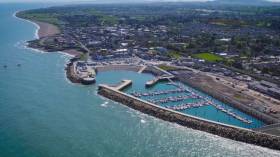Displaying items by tag: Greystones Harbour Marina
After a decade of dedicated service, Alan Corr, the marina manager of Greystones Harbour Marina in County Wicklow, retired at the end of February.
Alan has been a vital part of the marina's success story since January 2014, bringing his wealth of knowledge and expertise in the marine industry to the management of the east coast facility.
"Alan''s contribution to the marina has been invaluable, and his willingness to go above and beyond to assist berth holders, customers, and businesses has been widely appreciated," James Kirwan, Group Manager of BJ Marine and Greystones Harbour Marina" told Afloat.
"His colleagues, including Bernard, John, Marie, and Cian, consider themselves fortunate to have worked alongside him and will always remember his contributions fondly, Kirwan said.
"While Alan will be missed, he is looking forward to spending more time with his wife, daughters, and grandchild. Additionally, he plans on catching up on his fishing, a passion he has had for years," Kirwan added.
As Alan moves on to the next phase of his life, Greystones Harbour Marina welcomes Scott Matthews as their new marina manager.
Greystones Harbour Marina Seek New Marina Manager
Greystones Harbour Marina in County Wicklow wants to appoint a new marina manager.
The marina opened in 2013 and has grown consistently to become a busy 230 berth marina with 24-hour access and fuel on site.
Marine experience is desirable, although not essential.
All expressions of interest will be treated in the strictest confidence.
CVs along with a cover note should be submitted to BJ Marine Group Manager James Kirwan at [email protected]
Greystones Marina Pier Closed Over Anti-Social Behaviour
#Greystones - Greystones’ harbour master has closed access to the north pier in the North Wicklow town over worsening anti-social behaviour — including assaults on two harbour staff.
Alan Corr told the Wicklow Times this week that sustained anti-social activity by youths — such as drinking and dangerous diving into the adjacent Greystones Harbour Marina — has risen in recent months, and he expects it to only worsen over the school holidays.
“Just this week we have seen juveniles swinging from lifebelts and throwing them into the marina,” said Corr, who adds that he was knocked to the ground in an altercation with some of the youths.
Local officials were set to meet with harbour staff this past Tuesday (27 June) to discuss the future of public access to the amenity.
Councillor Derek Mitchell said he was “hopeful that a policing solution can be found”.





























































